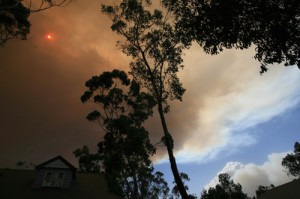 A lot of survival is simply thinking ahead. There are three primary areas of preparation to keep yourself and your family alive if the worst happens; water, food, and security. Unfortunately, even the best of us may only think about two of the three. Either we forget about a secure location, think someone else will have food or water covered or simply get so focused on the area we’re most concerned with that we don’t put the time into a broad range of preparations. What happens if disaster hits and we’re not prepared?
A lot of survival is simply thinking ahead. There are three primary areas of preparation to keep yourself and your family alive if the worst happens; water, food, and security. Unfortunately, even the best of us may only think about two of the three. Either we forget about a secure location, think someone else will have food or water covered or simply get so focused on the area we’re most concerned with that we don’t put the time into a broad range of preparations. What happens if disaster hits and we’re not prepared?
If the worst does indeed happen, you need to have what is called “situational awareness.” This is an ability to analyze the situation, ask the right questions and properly interpret the answers. For example: How bad is it? Is my home secure enough? Is it going to be secure long term? Are alternative locations easy to access? A little preparation will go a long way to answer these questions.
While you may have long-term supplies stockpiled, you also should remember to have a short-term kit ready for every person in your family. If you have an alternative location (such as a secure retreat) you need to be able to get there, so your vehicle becomes key to your plans. An older SUV will be the best for many as parts are easy to fix and maintain compared to newer models that are far more complex and dependent upon expensive and possibly difficult-to-acquire replacement electronics. Do you know how you are going to get places when everyone else is panicking? Planning your routes is a must. Remember the majority of people will not have made sufficient preparations and will be panicking as well; generosity is not something that can be counted on. When everyone is thinking about themselves, you can’t count on them to behave as they normally might, or even to be civil. Planning on total self-sufficiency is key.
Make sure to think about the supplies you are preparing as well. Climate will make a big difference here. If you live in the upper Midwest, thinking about winter supplies is critical even if you’re preparing in the middle of June. How will your plans be affected if there is a loss of power? Do you have a way to keep your loved ones warm over a long winter off the grid?
One area that many preppers ignore is “dry runs” or practice. Remember, practice makes perfect. Going over your preparations will not only help you make sure you really are prepared, but going through the motions will help you when tensions are high. You can perform habits without even consciously thinking about what you are doing. This will be key when you are rushed and trying to do everything at once. What about your communications? How will you communicate with your friends or loved ones, especially if they are involved in your planning? What if you are separated? How are you going to find out what is going on elsewhere? CBs and radios all require power. In your preparations, did you cover ways on how to obtain power? Solar or otherwise, they won’t work if they don’t get the juice.
The real key is to think these things through. Don’t rush out and buy a bunch of equipment without thinking about how your plans will work if things go badly. By “going badly” I don’t mean the crisis itself; I mean a failure in your own preparations. What if the crisis hits when you are not where you had hoped to be, or if your supplies are lost, stolen or damaged, or if a member of your team is hurt, killed or otherwise not around?
A lot of these things are common sense for someone who has been living an off-grid lifestyle, but for many others it is all foreign, as foreign as living in another country with different customs and practices. Paying attention, thinking ahead, and preparing are all keys to survival if the worst ever happens. A few low tech hobbies might be just the thing you need for a little extra preparation. If you hang out in front of the TV on a regular basis or spend more time on the computer than you really need to, perhaps you should replace those “hobbies” with something as equally enjoyable but far more valuable in a crisis, such as gardening, camping, learning self defense skills or firearms training. Wherever you are in your preparations, go back and challenge your thinking to see if you’re making the best use of your time, resources and talents.
 Off The Grid News Better Ideas For Off The Grid Living
Off The Grid News Better Ideas For Off The Grid Living



